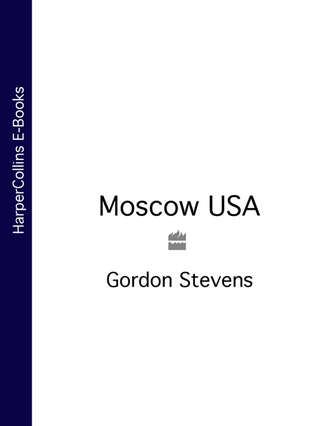
Полная версия
Moscow USA
‘Correct again.’
‘What’s Kincaid’s background?’
‘Ex-Agency. Soviet Division.’
The cigar smoke circled McIntyre like a halo. ‘What about the Russian?’
‘That’s Gerasimov’s business, not mine.’
‘So Gerasimov will be running the show?’
‘Gerasimov and myself. I’m flying to Moscow the day after tomorrow.’
Which was what he knew McIntyre wanted to hear.
The cumulus was white against the grey-green of the North Sea. Kincaid declined coffee, eased the business class seat back, and drifted into a light sleep. Thirty-three minutes later the stewardess shook him awake, asked him to fasten his seatbelt, and offered him a hot towel. He thanked her and massaged his face. The Thames was suddenly below him, London in front, then Heathrow, the lights coming fast at them. The 737 touched down, gently but firmly, and taxied to Terminal 4. Behind them a 747 lifted into the morning sky. The seatbelt signs flicked off. He pulled his bag from the overhead locker and made sure he was among the first off. Nine minutes later he was in the public area of Terminal 4. The queues were already clustered round the economy check-ins, and the boys were waiting at the coffee bar at the far end.
Brady rose and shook his hand. ‘You want a coffee?’
‘No time.’
‘Pick us up,’ the escort told the driver on the cellphone.
Twenty minutes later they had collected the shipment from bond, Kincaid and Brady dividing the load between them, and returned to the terminal. Fifty minutes after that BA872 climbed into the sky and carved a graceful bank east. An hour and seventeen minutes after that it crossed into what President Reagan had called the Evil Empire.
His first time back in Russia since the death on East 54th – the ghost crept up on him … His first time in Moscow since he’d betrayed Joshua …
The man who collected the BMW and began the twenty-minute drive to the airport wore an inconspicuous grey suit. The first gun he carried, in a shoulder holster on his left side was a Sig Sauer P226, 15-round magazine, and the second was a shortened AKSU47, 5.45mm 30-round mag, which he would hang on a pull strap under his jacket.
Central Moscow was hot and busy; the usual BMWs and Mercedes parked outside the usual places, and the usual minders with the usual padded jackets. Last year the fashion had been shell-suits and tennis-ball haircuts.
The traffic lights next to the Moscow Dynamo stadium weren’t working, and there was an army tank at the crossroads outside the red-brick complex built for Catherine the Great to change her clothes before entering Moscow on her visits from St Petersburg, so there might be a road block later.
He had bought the 320 in Berlin, driven through Poland, crossed the border at Brest, and waited patiently while the police to the west checked his sales and purchase documents and those in the east his travel visas. And when he had arrived in Moscow he had customized it to his own specification. Rear window apparently cracked, no hub caps and front left wing slightly dented. Paintwork off-colour and seat covers, though not the leather beneath them, worn and ripped. Everyone in Moscow wanted a BMW, but with any luck nobody would want his.
The M10 to St Petersburg stretched in front of him, and the white and glass façade of the Novotel Hotel loomed to his right. He jerked round a pot-hole and pulled off the road and into the airport complex. The road in front divided, one section looping to the departures area on the upper floor, and the other passing underneath the canopy to arrivals. He drove through, parked near the Novotel, hung the Kalashnikov under his jacket, and walked back to the terminal.
The interior of the arrivals area was dirty and poorly-lit, the usual group of freelance cab drivers clustered around the exit from customs, and more drivers circling the floor near the bank and the shop. A few guards, not many and even those not paying attention. He returned outside and stood on the pavement.
Two minutes later the convoy swept in – two Saab 9000s, the Volvo between them. Pick-up time, he thought. The drivers remained in the cars, plus one passenger in each of the Saabs. The four men who left them – two from the first, one each from the second and third – moved inside. All were young – late twenties, early thirties – big build but athletic movement. The men went inside and the convoy pulled toward the Novotel.
In the sky to the west he saw the sun glint on the incoming plane.
Kincaid felt the bump as the 767 touched down. The Boeing swung right, followed the taxiway and stopped, and the seatbelt signs flicked off. Kincaid pulled one bag on to the seat, stood in the aisle, and allowed Brady to stand in front of him and pull the other bag from the floor. Whyte came this way yesterday, he was aware; Whyte thought everything was going smoothly. He took the weight of the bag, thanked the cabin crew and walked up the tunnel of the jetbridge. The woman in the Border Guard uniform was at the top, two men with her.
‘Kincaid?’ One of the two pick-ups greeted him in Russian.
‘Yes.’
‘How’s the weather in London?’ The first line of the code, still in Russian.
‘Fine, how about Moscow?’
‘Sunnier than Washington.’
Right pick-up team today.
He and Brady gave the woman their passports and visas; she ticked them off a list, waited till one other passenger joined them, the others going right to the normal immigration area, then she led them left, along the corridor, through the duty free area, and up the stairs to the VIP lounge. The room was small, a bar to the left, a Daewoo television set in one corner, an arrivals/departures monitor hanging from the ceiling, and two girls in an immigration booth to the right. The walls were covered with dark grey hessian and the seats were vinyl.
Two more pick-ups were waiting for them. Ten minutes later one of the pick-ups collected the passports from the window of the immigration booth. ‘Bring the cars in,’ the komandir, the team leader, told the drivers on the Motorola.
They left the lounge, went down the stairs, and cut through the crowds in the arrivals area. Sheremetyevo smelt wrong – it hit Kincaid: dark terminal and darker corners; so who was waiting for him, who was going to try to take him and Brady and the Omega guys around them? They sliced through the waiting drivers. So where the hell’s the angel-khzanitel, because that was what the briefing in London had said: security pick-up plus guardian angel. Hope to Christ the Omega boys had spotted whoever might be waiting for them, hope to hell the angel-khzanitel had him covered. Christ, why wasn’t he carrying?
The convoy came in – Saab 9000 in front, Volvo, second Saab 9000 behind – and stopped immediately opposite the main doors, the drivers remaining in place, engines running, and two men getting out of the lead and tail cars, neither of them looking at the cars, Uzis held discreetly beneath their coats and eyes scanning the crowd and the pavement and the doors.
Kincaid came through the door and saw the convoy: Saab, Volvo, Saab; saw the two men by the cars still scanning the crowd. Knew he was being taken care of but looked round anyway. They were five metres from the Volvo. The man beside it opened the rear door. Kincaid threw the bag on to the floor, crossed over to the other side of the car, one of the pick-ups already in the roadway on that side, and slid in. Brady threw his bag on the seat and tumbled in beside it. One of the pick-ups eased into the front passenger seat and clicked on the thief locks. The other pick-ups were already getting into the Saabs, two remaining on the pavement and still checking, even as the convoy began to pull off, then dropping through the doors as the drivers accelerated away.
The man with the Sig Sauer and the AKSU47 under his coat collected the BMW, left Sheremetyevo and pulled left toward Moscow.
Five years ago this week Vorkov had contacted him in Boston — the teni proshlovo came back at him again … Five years ago he had been in the air to La Guardia – the ghost reminded him … Five years ago Vorkov had directed him to the restaurant on East 54th …
In front of him Nikolai Sherenko saw the convoy.
2
The convoy cut across the river, passed the outer ring road, dropped toward the city centre and turned right down Gertsena Ulica. The street was lined with shops, three- or four-storey apartments and offices above them, and an occasional white-painted church or garden, railed off and set back from the road. The lead Saab stopped and the pick-ups stepped on to the pavement.
The door was wood and painted a dark heavy brown, no number on it. On one side was an electrical shop and on the other a small supermarket, both filled with shoppers. One of the pick-ups crossed the pavement and checked inside. The Volvo slid in behind the lead Saab, no doors opening, and the Volvo itself pointing out with enough space in front to scream away. The tail Saab slid in behind the Volvo and the other pick-ups got out, hands inside their jackets. The pick-up at the door checked inside and nodded.
Still a chance for someone to take them out – Kincaid glanced down and across the street. On the opposite side of the road the BMW pulled into position.
Clear, the komandir told Kincaid. Kincaid slid out, pulled the bag after him, Brady behind him and the pick-ups tight around them, crossed the pavement, up the single worn step to the door, and entered the building.
The floor inside was stone, there were stone stairs to the left, the walls were painted a faded off-cream, and an ancient elevator with a metal grille rattled up the front. The Omega team ignored the elevator and took the stairs, turned a corner, came to a landing, two doors off it, and continued up, came to another landing then another. The door on the left was wood but the one on the right was padded leather, the usual indication that the door itself was steel. The keyboard for the security lock was on the left. The team leader punched in the combination, pushed open the door and went in, Kincaid and Brady behind him and the pick-ups behind them.
The walls and ceiling of the outer office were lined with wood and the linoleum on the floor was worn. There were two desks, the men lounging against them standing to greet them as they came in. A door on the left ran back down a corridor, no indication what was there, and another corridor ran off the outer room, directly in front of them, two doors off it on the left and one on the right. A shaft of sun struggled through the bars on the single window in the room, the dust playing in its light.
‘Welcome to Omega,’ the team leader said in Russian.
Sure, Kincaid thought.
The man who entered from one of the rooms in the corridor in front of them was mid-thirties, just under six feet tall and wiry build. ‘Glad you made it safely.’ The accent was English. ‘Pat Riley.’ ISS’s manager in Moscow, Kincaid understood; service with the Parachute Regiment, ending his career as a major in the Third Battalion, plenty of time at the sharp end, including Northern Ireland, and fluent in Russian.
They shook hands then Riley led Kincaid and Brady along the corridor.
‘ConTex have been notified that you’ve arrived. They want five million delivered right away, the boys will see to that. They want the other million escorted to Kazakhstan tomorrow morning. Tom, you take that down with an escort. Mikhail’s on his way in.’ Mikhail Gerasimov, Grere Jameson’s partner in Moscow. ‘Conference as soon as he arrives. You needn’t attend, Tom.’
He led them into the office on the right of the corridor, overlooking the street. The room was functional but sparse: cream-painted walls, desks with computers, a good-looking woman at one, late twenties and well-dressed, and men at the others. Riley introduced them in Russian, translating for Brady:
‘Tatyana, our office manager …
‘Oleg and Josef, a couple of the boys …
‘Igor Lukyanov …’ Former KGB intelligence, their access point to the present FSB. Lukyanov was five-six and squat; his blond hair was short, and the suit jacket which hung on the back of his chair was expensive and well-cut.
‘Igor, this is Jack Kincaid and Tom Brady from DC. Jack’s working on the ConTex investigation. You probably had a file on him in the old days.’
Gerasimov’s room was on the opposite side of the corridor, and furthest from the outer office. It was wood-lined and small, functional desk and computer, grey carpet on the floor, one print on the wall, and a single window to the courtyard at the rear. The conference room next to it was also small: oval table with hard-backed chairs round it, window on to the courtyard, and the walls were papered, the design like the onion domes of St Basil’s in Red Square.
‘Not like ISS’s offices in London or DC,’ Riley suggested to Brady.
‘Not quite,’ the ex-FBI man conceded.
Riley perched himself on the edge of the table. ‘One thing you have to realize, Tom. Moscow is the third most expensive city in the world. Office space is at a premium; so you pay through the nose or you do a deal with someone you know for somewhere like this. Another thing you have to understand is how the system works here. The owner’s an old friend of Mikhail’s. He runs an import-export business from an office down the corridor, to the left as you come in. We get cheap rates for Omega, and he gets protection from the government and the mafia.’
He led them back to the main office and poured them each a coffee from the percolator in the corner. On one of the phones someone was speaking to Kazakhstan, on another to Kiev, the secure fax humming in the background.
‘While you’re in Moscow, for this trip at least, you’ll be staying in the company apartment which I use. Tom, you’ll be collected at five tomorrow morning, then fly to Kazakhstan with an escort and an interpreter. You return to London via Budapest. It’s an eye-opener. You may even enjoy it.’ He finished the coffee and poured himself another. ‘I’ve asked one of the boys to show you both around this evening.’
He turned to Brady. ‘Give us five, Tom.’ The order was polite and friendly. Brady nodded. Riley settled behind the desk in the left corner of the room and Kincaid pulled a chair in front of it and took the file Riley gave him.
‘Background on the ConTex investigation. You’ll be working with one of Mikhail’s people. We know this is a team job, but remember this is Moscow. New Moscow maybe, but some things never change. If you want anything, do it through them.’
Mikhail Gerasimov was on his way in, the office manager told them.
‘Any questions?’ Riley asked Kincaid.
‘Not yet.’
Kincaid went through to the conference room, sat at the table and read through the file. It was eleven hours since he had first been woken in Amsterdam and told to get to London, and the tiredness was seeping into him. Perhaps because he had been woken in the middle of the night, perhaps because he’d been carrying six million dollars and the previous day six million dollars had gone missing. Perhaps because he was in Moscow again.
The door opened and Gerasimov and Riley came in. Gerasimov was forty-eight, tall and powerfully built.
‘Mikhail Sergeyevich Gerasimov.’ Riley did the introductions. ‘Jack Kincaid.’
‘Good to meet you, Jack.’
‘You too, Mikhail.’
They sat at the conference table, Gerasimov at the head, his back to the window and facing the door, Riley at the other end, and Kincaid between them. The door to the boardroom opened again and the fourth man came in. I know you – it was a flash in Kincaid’s subconscious. I’ve seen you before.
‘Jack Kincaid, Nikolai Sherenko.’ Gerasimov did the introductions this time. ‘I think you’ve already met.’
‘Sort of.’ Kincaid spoke in Russian. The angel-khzanitel, at the airport. ‘Good to meet you.’
‘You too.’ Sherenko’s reply was in English. Traces of East Coast, almost Boston, Kincaid thought.
Sherenko hung his jacket on the back of the chair opposite Kincaid and sat down. The Sig Sauer still hung in the shoulder holster, but he had left the Kalashnikov in the secure cupboard in the other office.
‘Anyone interested in what was happening today?’ Gerasimov asked him.
Sherenko shook his head. ‘Not after yesterday.’
Gerasimov nodded and opened the briefing. ‘The pick-up went smoothly, which it should have done anyway, but ConTex is pleased. ConTex has now confirmed the contract to investigate the six million that went missing yesterday. Grere Jameson flies in from DC tomorrow to head up that investigation.’
‘Why?’ Sherenko asked.
‘Why what?’
‘Why is it necessary for someone to come in from DC to head an investigation in Moscow?’
Arrogant bastard – it was a flicker in Kincaid’s subconscious.
Gerasimov was unruffled. ‘Politics. ConTex is an American company, therefore wants to see an American running the show. We want the main ConTex security contract, they call the tune, we dance.’ He switched his attention to Kincaid. ‘You’ve read the reports?’
‘Yes.’
They ran through the various lines of enquiry. Whether the theft came from a conspiracy or a leak of information. ConTex itself, and the Americans and Russians who worked for the company. Whether the plan for the robbery began in Kazakhstan or Moscow, and who knew or might have known of the shipment. The security and courier companies contracted to ConTex and the couriers themselves, including the significance of Pearce’s sudden illness.
‘No sign of Whyte yet?’ Kincaid asked.
‘We haven’t had time to make enquiries. The primary objective today was the safe pick-up of the second shipment.’ Gerasimov spread his hands on the table. The hands were large and the fingers were thick and muscular. ‘We have his personal details and description, but we’re still waiting for a photograph.’
They finished the preliminaries and moved to the short and medium term stages of the investigation.
‘Background checks on the key players, both American and Russian. Whether any of them are in financial trouble or show indications in the past of sudden jumps in wealth.’ Gerasimov spoke in shorthand, Kincaid thought; the delivery clear-cut but staccato. Or perhaps it was the way he himself heard it, the combination of tiredness and the fact that he hadn’t listened to someone speaking Russian for five years. ‘Whether any of them are screwing, or being screwed by, anyone who might be a security leak. Jack, you run one set of checks through ISS’s offices in London and Washington. Nik, you run a second set through Igor Lukyanov, see if the computers at the FSB have anything to offer. You also check the morgues. Start this evening, show ConTex in Houston that we’re already moving.’
Five years ago this week he stood in the morgue at Belle Vue … it was a wisp in Kincaid’s subconscious.
‘Jack, you arrange interviews with ConTex personnel. Nik, you do the same with the security company personnel. Electronic sweep of ConTex offices and examination of their communication systems. Questions to airline and airport staff, plus interviews with VIP lounge staff and Border Guard personnel for a description of the bogus team which met Whyte.’
Gerasimov looked round the table. ‘Questions?’
Sherenko raised his hand. ‘How much time do we have and how long and how far do we go?’
‘I’ll tell you after Grere and I have talked.’
‘But what’s the bottom line?’
‘We want the main security contract for ConTex, therefore we’ll pursue this enquiry as far as we can, but the bottom line is that we don’t stand a snowball’s chance in hell of getting the money back.’
‘And ConTex know that?’
‘Grere has already warned them that the chances of getting the money back are zero. ConTex aren’t virgins. If we come up with anything more than a detailed report, they’ll be happy.’
He closed the meeting and they returned to the main offices, Sherenko to his desk in one corner of the main office, and Kincaid to one opposite which had been cleared for him. Brady was waiting patiently. Couple of things to set up, then they’d be gone, Kincaid told him.
Igor Lukyanov crossed the room and slipped the photograph on to Sherenko’s desk. ‘Zak Whyte. Just come through from London.’
Sherenko studied it and passed it to Kincaid. Better get it out the way, his expression said. He lifted the telephone and punched the number. ‘This is Nikolai Sherenko at Omega. We’re looking for someone who went missing yesterday. Okay if we come now?’ He put the phone down. ‘You ready?’
My first time in Moscow since Joshua, Kincaid thought, and the first thing we do is go to a morgue. ‘Yeah, I’m ready.’ He turned to Brady. ‘Get Riley to arrange transport for you back to the apartment. We’ll pick you up when we’re through.’
They ran off copies of the photograph, took the stone stairs to the ground floor and collected Sherenko’s BMW from the courtyard at the rear. The evening was busy, the pavements crowded.
Kincaid settled in the passenger seat. ‘So where are we going?’
‘The central criminal morgue. Anybody goes missing, that’s where they turn up.’
‘If they turn up,’ Kincaid suggested.
Sherenko laughed.
They crossed the river, drove along Leninski Prospekt, and turned left down Profsojuznaja Ulica. It was early evening, warm and pleasant, Sherenko driving with the window open and children playing on the green areas between the apartment blocks. They approached the junction with Krasikova Ulica and the entrances to Profsojuznaja metro station. The buildings here were more grey and featureless, arcades of shops along the street and brightly painted kiosks selling liquor, food, vegetables and bread along the pavements on each of the roads leading into the junction, men and women milling around them. Sherenko turned left at the lights, stopped in a pull-in for buses and trams in front of a line of kiosks, and got out, Kincaid behind him.
Most of the kiosks on this stretch of road were selling alcohol or cigarettes; the doors were locked and the vendors were seated inside behind a small window. Sherenko checked along the line, stopped at the third, crouched slightly because the windows were low, examined the bottles on display, and pointed.
Stolichnaya.
Small bottle.
The woman inside took a bottle from a shelf, and placed it on the wooden ledge inside the window. Sherenko counted out nine 1000-rouble notes, passed them through, and the woman passed him the bottle. Sherenko checked that the seal on the top was intact, checked the writing on the label, checked the number stamp on the back of the label, turned the bottle over and checked that the glue on the back of the label ran in wide even lines, shook the bottle and watched for the vortex of bubbles. When he was satisfied the vodka wasn’t counterfeit he turned back to the car and put the bottle in the glove compartment. The evening was still warm, still sunny. They drove up the hill and turned into C’urupy Ulica.
Kincaid left the subway and crossed to Belle Vue hospital. Manhattan was noisy around him, a helicopter in the sky above and the wail of police sirens from the other side of the block.
Washing hung from the balconies of apartment blocks on the right and children played on the grass in front. A woman pushed a pram and a young couple walked together, holding hands. They passed a tennis court, also on the right, two thin girls playing with one ball and broken rackets. Silver birches lay on the ground where they had been cut down during the winter but not sawn up or hauled away, foliage still clinging to them and children playing in them. A dog crossed the road in front of them.
Kincaid stepped through the reception area. Time running out already, he knew. And he shouldn’t be here anyway.
The building to the left was new and low. Beyond it was another, set back from the road and grey, seven storeys high. Sherenko passed the modern building, passed the grey building, and turned left down the rough earth track along its far side. The link metal fencing on either side was torn, grass and weeds growing up through it, and the security gate at the bottom was hanging off its hinges. Beyond it was a second grey-brick building, two storeys high though the height and shape of the wide doors in front suggested there was only one level. Two policemen lounged in the doorway and a rubbish skip lay in the weeds to the right. A young man with blond hair, blood splashed over his surgical greens and white boots, fetched something from one of the three cars parked on a dust patch in front.






